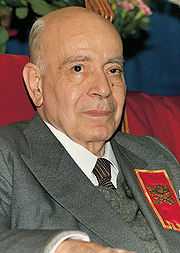
Plinio Corrêa de Oliveira
Encyclopedia

São Paulo
São Paulo is the largest city in Brazil, the largest city in the southern hemisphere and South America, and the world's seventh largest city by population. The metropolis is anchor to the São Paulo metropolitan area, ranked as the second-most populous metropolitan area in the Americas and among...
, December 13, 1908 — October 3, 1995) was a Brazil
Brazil
Brazil , officially the Federative Republic of Brazil , is the largest country in South America. It is the world's fifth largest country, both by geographical area and by population with over 192 million people...
ian intellectual
Intellectual
An intellectual is a person who uses intelligence and critical or analytical reasoning in either a professional or a personal capacity.- Terminology and endeavours :"Intellectual" can denote four types of persons:...
, politician
Politician
A politician, political leader, or political figure is an individual who is involved in influencing public policy and decision making...
and Catholic
Catholic
The word catholic comes from the Greek phrase , meaning "on the whole," "according to the whole" or "in general", and is a combination of the Greek words meaning "about" and meaning "whole"...
activist.
His mother, Lucilia Corrêa de Oliveira, was a devout Roman Catholic. He was educated by Jesuits. In 1928 he joined the Marian Congregations of São Paulo and soon became a leader of that organization, often giving speeches. In 1933 he helped organize the Catholic Electoral League
Catholic Electoral League
The Catholic Electoral League was a Brazilian political pressure group functioning from 1932-1937 under the direct auspices of the Catholic Church...
and was elected to the nation’s Constitutional Convention. As the youngest congressman in Brazil's history he was part of the "Catholic bloc".
He assumed the chair of Modern and Contemporary History at the Pontifical Catholic University of São Paulo. He was also the first president of the São Paulo Archdiocesan Board of Catholic Action.
From 1935 to 1947 he served as director of the Catholic weekly Legionário. In 1951 he began his direction of the monthly paper Catolicismo. From 1968 to 1990 he wrote a column for the Folha de São Paulo, the city’s largest daily newspaper. He opposed communism
Communism
Communism is a social, political and economic ideology that aims at the establishment of a classless, moneyless, revolutionary and stateless socialist society structured upon common ownership of the means of production...
and Catholic leftism in Latin America.
An admirer of Thomas Aquinas
Thomas Aquinas
Thomas Aquinas, O.P. , also Thomas of Aquin or Aquino, was an Italian Dominican priest of the Catholic Church, and an immensely influential philosopher and theologian in the tradition of scholasticism, known as Doctor Angelicus, Doctor Communis, or Doctor Universalis...
, he was the author of 15 books and over 2,500 essays and articles. His works include: In Defense of Catholic Action, Revolution and Counter-Revolution, The Church and the Communist State: The Impossible Coexistence, Nobility and Analogous Traditional Elites in the Allocutions of Pius XII, and many others.
To put his ideas into action, he founded the Brazilian Society for the Defense of Tradition, Family and Property
Tradition, Family and Property
Tradition, Family, and Property is a movement of civic organizations of Traditional Catholic inspiration.The first TFP was founded by Plinio Corrêa de Oliveira in Brazil in 1960, and he remained president of the Brazilian TFP's national council until his death in 1995....
(TFP) in 1960 and served as president of its national council until his death in 1995. His treatise Revolution and Counter-Revolution inspired the founding of autonomous TFPs groups in nearly 20 countries worldwide.

